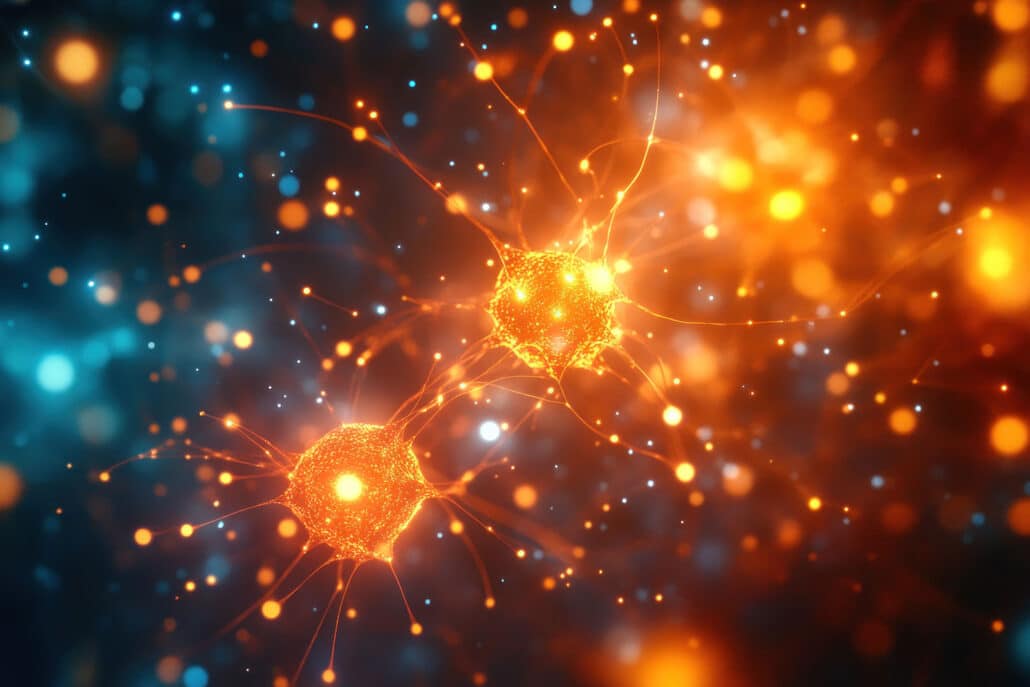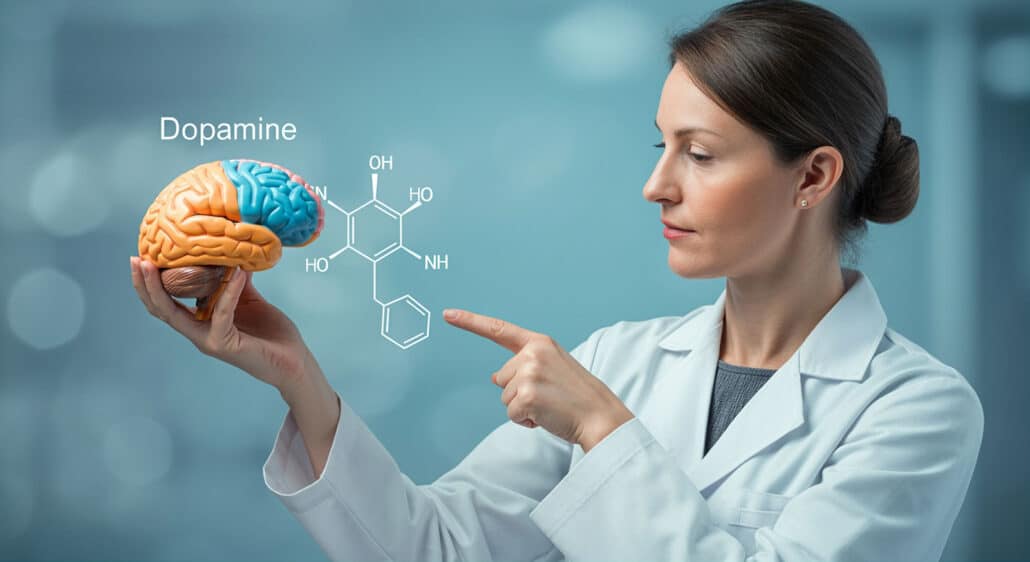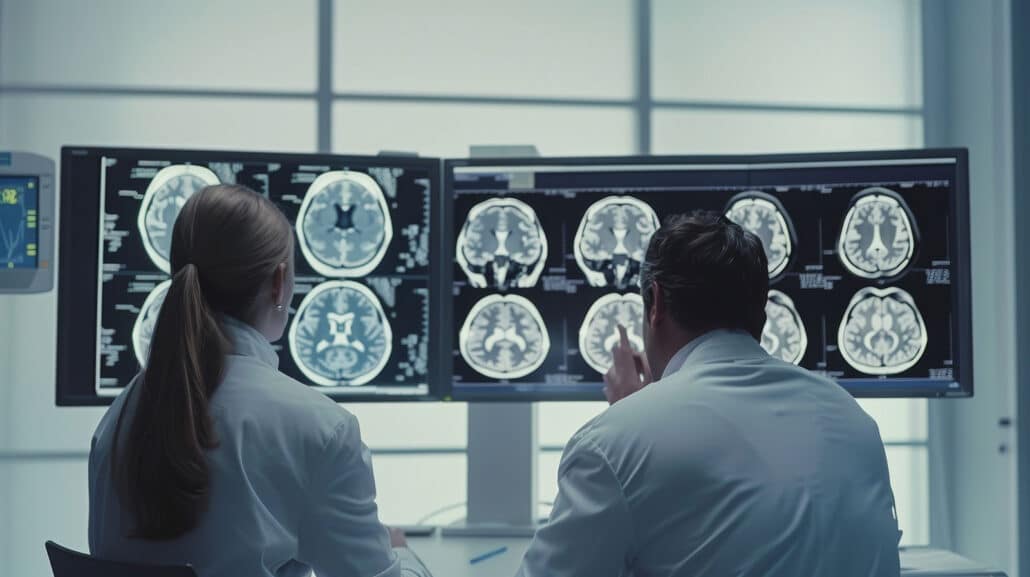Alcoholism is often considered a brain disease because it messes with the brain’s neurotransmitters. It rewires the brain’s chemistry, throwing its natural processes off balance.
This article discusses the effects of alcohol on the brain and how it alters brain chemistry over time. What neurotransmitter does alcohol affect, and why does it lead to addiction? Let’s discuss.
Table of Contents
What Are Neurotransmitters?
To understand what neurotransmitters alcohol affects, we need to discuss what neurotransmitters are and do.

Neurotransmitters are chemicals that allow neurons—also known as nerve cells—to communicate with each other throughout the body.
We’ve yet to discover the exact number of unique neurotransmitters in the human brain, but scientists have identified at least 100 distinct types. These transmitters regulate a handful of bodily functions, including mood, emotions, movement, cognition, and processes like heart rate and digestion.
When a neuron sends a signal, it releases neurotransmitters into the synapse (a small gap between neurons). These chemicals bind to receptors on the receiving neuron, triggering a response that either excites or inhibits further signals.
Excitatory neurotransmitters cause the receiving neuron to fire its own signal, stimulating brain activity. Inhibitory neurotransmitters do the opposite—they reduce activity and calm the brain.
How Does the Body Know What Neurotransmitter to Release?
Neurons release neurotransmitters based on the signals they receive.
If the body needs to be alert or take action (like in a dangerous situation, for example), the body releases excitatory neurotransmitters like glutamate or norepinephrine. If the body needs to relax or slow down, it releases inhibitory neurotransmitters like Gamma-aminobutyric acid (GABA) or serotonin.
The release of neurotransmitters isn’t something you can consciously control. You can’t just go to work, exhausted, and think time to release excitatory neurotransmitters! to switch your brain to work mode. It’s this very reason that people can’t choose to be happy, relaxed, or alert all the time, and why mental illnesses like depression, ADHD, anxiety, and addiction exist.
The brain and nervous system work together to decide what’s best released based on the situation, past experiences, and the body’s needs. They process signals from the environment and internal body conditions, then adjust neurotransmitter levels accordingly.
That said, neurotransmitter activity can be triggered artificially.
Medication, drugs, and exercise can impact how much is released or how long it stays active in the brain.
For example, antidepressants (SSRIs) increase serotonin levels to regulate mood while caffeine blocks adenosine to keep you alert.
Alcohol, meanwhile, boosts the effects of GABA to induce relaxation and drowsiness while at the same time blocking glutamate receptors to further slow down brain function.

What Neurotransmitter Does Alcohol Affect?
Alcohol has a profound impact on neurotransmitters, leading to a wide range of psychological and physical effects when consumed even in moderation.
Since the body has potentially hundreds of neurotransmitters (many of which are yet to be discovered), we don’t know the exact number affected by alcohol. However, research has identified several key neurotransmitters that are most affected by alcohol consumption.
These include:
GABA
Gamma-aminobutyric acid (GABA) is the brain’s primary inhibitory neurotransmitter. It slows down brain activity to regulate mood, reduce anxiety, support sleep, and prevent overstimulation.
Alcohol is an indirect GABA agonist, meaning that it mimics—or more accurately amplifies—the effects of GABA.
When alcohol (specifically ethanol) enters the brain, it binds to GABA receptors and makes them more responsive to GABA. This is why alcohol causes relaxation, drowsiness, and reduced anxiety in the short term.
Since alcohol only mimics rather than replacing GABA’s effects, the brain compensates by reducing natural GABA production or making GABA receptors less sensitive. So when alcohol is removed, the brain is left with too little GABA activity, leading to withdrawal symptoms like anxiety, tremors, or even seizures.
Glutamate
Glutamate is the brain’s main excitatory neurotransmitter.
It plays a key role in most CNS functions, including learning, memory, attention, movement and coordination, emotional regulation, and sensory processing (vision, hearing, and touch).
Excessive and long-term alcohol consumption throws these CNS functions out of balance, leading to slower thinking, poor coordination, memory impairment, and blackouts.
Alcohol inhibits glutamate by blocking glutamate gateways called N-methyl-D-aspartate (NMDA) receptors. In an attempt to restore normal brain activity, the brain increases glutamate production. It recognizes that the brain is producing way too much GABA and needs to balance it out by producing the same amount of glutamate.
But since the gates are blocked, the extra glutamate sort of just stays there, waiting for an opportunity to bind. Once alcohol is removed, the gates suddenly open and all that accumulated glutamate rushes in at once.
This explains why chronic alcohol use can lead to withdrawal symptoms like anxiety, restlessness, and even seizures when alcohol is suddenly removed. The brain is flooded with too much glutamate and not enough GABA to balance things out.
Dopamine
Dopamine is perhaps the most well-known neurotransmitter in the brain. It acts as the “reward center” and plays a major role in how we feel pleasure.
Smelling cookies baking in the oven, exercising, meeting with a close friend, sex, and shopping are activities that can trigger dopamine production. It also plays a role in other major functions, like heart rate, movement, kidney function, blood vessel function, lactation, pain processing, sleep, and learning.

Low levels of dopamine can make you feel unmotivated, moody, and tired. It can also lead to more serious disorders like Parkinson’s disease, Restless Leg Syndrome (RLS), depression, and ADHD to name a few.
Alcohol triggers the release of dopamine levels in the brain’s reward system. This is why people feel happy, relaxed, and giddy when drinking.
Repeated use of alcohol disrupts the brain’s natural dopamine balance, causing individuals to drink more and more as their tolerance and dependency increase.
Serotonin
Serotonin is much like dopamine; they both create feelings of happiness and pleasure. The difference is that dopamine creates motivation and reward-driven pleasure, while serotonin is more associated with overall mood stability and long-term well-being. It helps regulate mood, sleep, appetite, and stress levels, preventing feelings of anxiety and depression.
Alcohol temporarily increases serotonin, making people feel calmer or happier after drinking. But serotonin levels drop as soon as alcohol leaves the system, leading to feelings of irritability, anxiety, or even depression.
Endorphins
Alcohol also triggers the release of endorphins, which are the brain’s natural painkillers and mood boosters.
Endorphins create feelings of euphoria, relaxation, and pain relief, similar to the effects of opioids. Repeated alcohol use can alter the brain’s endorphin system, making it harder to experience pleasure naturally without alcohol. This can lead to tolerance, where a person needs to drink more to feel the same effect.
Adenosine
Adenosine is the neurotransmitter primarily responsible for a person’s need to sleep.
Alcohol increases adenosine levels, which makes you feel drowsy and sedated while drinking. The overproduction of adenosine stimulated artificially by alcohol forces the brain to reduce natural adenosine activity, leading to poor sleep quality and insomnia.
Those who drink to induce sleep often wake up feeling exhausted and slugging because it interferes with REM sleep, which disrupts deep sleep. Alcohol also throws off the body’s natural sleep-wake cycle, making it harder to fall and stay asleep without it.
Enkephalins and Dynorphins
Enkephalins and dynorphins belong to the same class of endorphins called endogenous opiates.
Enkephalins regulate pain and mood, though to a lesser extent than endorphins. Alcohol boosts enkephalins alongside endorphins.
Meanwhile, dynorphins produce feelings of dysphoria, stress, and discomfort—mostly to prevent the brain’s reward system from becoming too overstimulated.
What’s interesting is that researchers believe that dynorphins are the ones responsible for withdrawals.
When the brain is too overloaded with pleasurable sensations (due to increased production of dopamine, serotonin, GABA, etc.), dynorphins produce more of themselves to balance brain activity. It’s basically saying, whoa there, you’re not supposed to be this happy, it’s unnatural! and floods the brain with dynorphins to keep things in check.
The more someone drinks, the more dynorphins build up over time. And when alcohol is removed, the person feels worse than before. This cycle is why alcohol can become habit-forming—people drink not just to feel good but also to escape the dynorphin-driven discomfort when sober.

Final Thoughts
There are numerous other neurotransmitters that go haywire when affected by alcohol, but the ones mentioned above are the most significant ones.
When the brain gets used to the pleasurable effects of alcohol, it adapts by reducing its natural production of key neurotransmitters like dopamine, serotonin, and endorphins. At the same time, it increases stress-related chemicals like dynorphins and glutamate, creating an imbalance that makes sobriety feel difficult.
As a result, when someone stops drinking, they often experience mood swings, anxiety, depression, and cravings, not because they lack willpower, but because their brain is struggling to regain balance.
If you or someone you know struggles with alcohol addiction, we can help. Contact us today to learn more about treatment options, support programs, and coping strategies. Recovery is possible, and you don’t have to go through it alone.
Published on: 2025-04-01
Updated on: 2025-04-06

